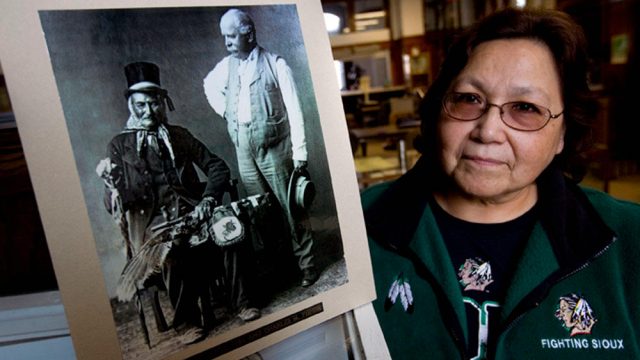Maybe We Spend Too Much Time Talking For Native Americans Instead Of Talking To Them

Eunice Davidson's great great great great grandfather, Chief Little Fish, was the original leader of the Spirit Lake Nation tribe. photo by Eric Hylden/Grand Forks Herald
Last week a poll released by the Washington Post found that roughly 90 percent of Native Americans are not offended by the “Redskins” nickname.
I’ll admit to being a little skeptical. While I think hostility to Native America-themed nicknames among Native Americans is often overstated, I’d like to see more research done before I’m willing to buy that 90 percent are ok with something like the “Redskins.” Which easily has to be one of the most provocative Native American nicknames still in use.
Even so, the reactions the poll set off were very entertaining. For instance, this discussion on ESPN where a bunch of people who aren’t Native Americans concluded that the poll might mean that Native Americans don’t know they’re supposed to be offended.
“It could just be that others don’t know the history of it and therefore aren’t offended,” commentator Israel Gutierrez said. “There’s so much history there. Maybe even Native Americans don’t know the history.”
If there is something more offensive than calling a Native American a “redskin” it might be suggesting that a Native American is too dumb to realize that they’re supposed to be offended by the term “redskin.”
North Dakota has had its own version of the Redskins controversy with the fight over the “Fighting Sioux” nickname at the University of North Dakota, and during that debate the opponents of the nickname were often as obnoxious as Mr. Gutierrez.
I’ve always remembered this article from 2009 by reporter Tu Uyen Tran about news that the Spirit Lake Sioux tribe had voted, by a large majority, in favor of the nickname. The reaction from nickname opponents was to suggest that they hadn’t had enough time to educate tribal citizens about their need to be offended:
Terry Morgan, a key anti-nickname organizer, said his side just didn’t have enough time. He’d recently gone to a pro-nickname household, he said, shared information and converted them.
“If I could honestly sit down with a lot of people, I could talk a lot of people out of it,” Morgan said. He’s not sure what nickname opponents will do next, he said, but they’ll still keep fighting.
This struck me as so remarkably arrogant that the comments have stuck with me for years. If you have to explain to people why they should be offended, maybe there isn’t really grounds for offense.
Ultimately the anti-Fighting Sioux activists won the battle. The university no longer uses the logo or nickname, having replaced it with the bland and uninspiring Fighting Hawks nickname. But I don’t think you can say that the change happened at the behest of Native Americans.
The Spirit Lake Sioux tribe not only voted for the logo/nickname in 2009, but they filed a lawsuit against the NCAA to keep the nickname as well. At the Standing Rock reservation the Sioux tribal leaders wouldn’t let their people vote on the issue.
I’m not a fan of collegiate sports in general, or UND athletics in particular, but I spent years writing about the Fighting Sioux issue because it was an interesting cultural phenomena. The pro-Fighting Sioux folks from the Native American communities I have spoken to over the years – many of whom, I know, were also supportive of the Redskins nickname as it happens – would tell me often about how they felt disenfranchised. They said that those who talked loudest about wanted to honor and respect Native American culture would often ignore their point of view because it was the wrong point of view.
They felt like their views only mattered when they were the right sort of views. If they strayed from what Native Americans are supposed to believe, according to certain political movements, their views were discounted.
Given this reaction to the Redskins nickname poll, it’s easy to see their point.
Our country’s Native American communities are perhaps less represented in our national dialogue than any other group. This is probably a side effect of their being herded onto remote parcels of land generations ago, to be out of sight and out of mind for the larger public.
But however this situation came to be, maybe it’s time to stop telling Native Americans how they should feel about the world around them and start listening to them.
There is an unfortunate tendency to think of minority groups as being monolithic in their views on certain issues. We need to stop acting as though we know what people think, or should think, because of their skin color.




